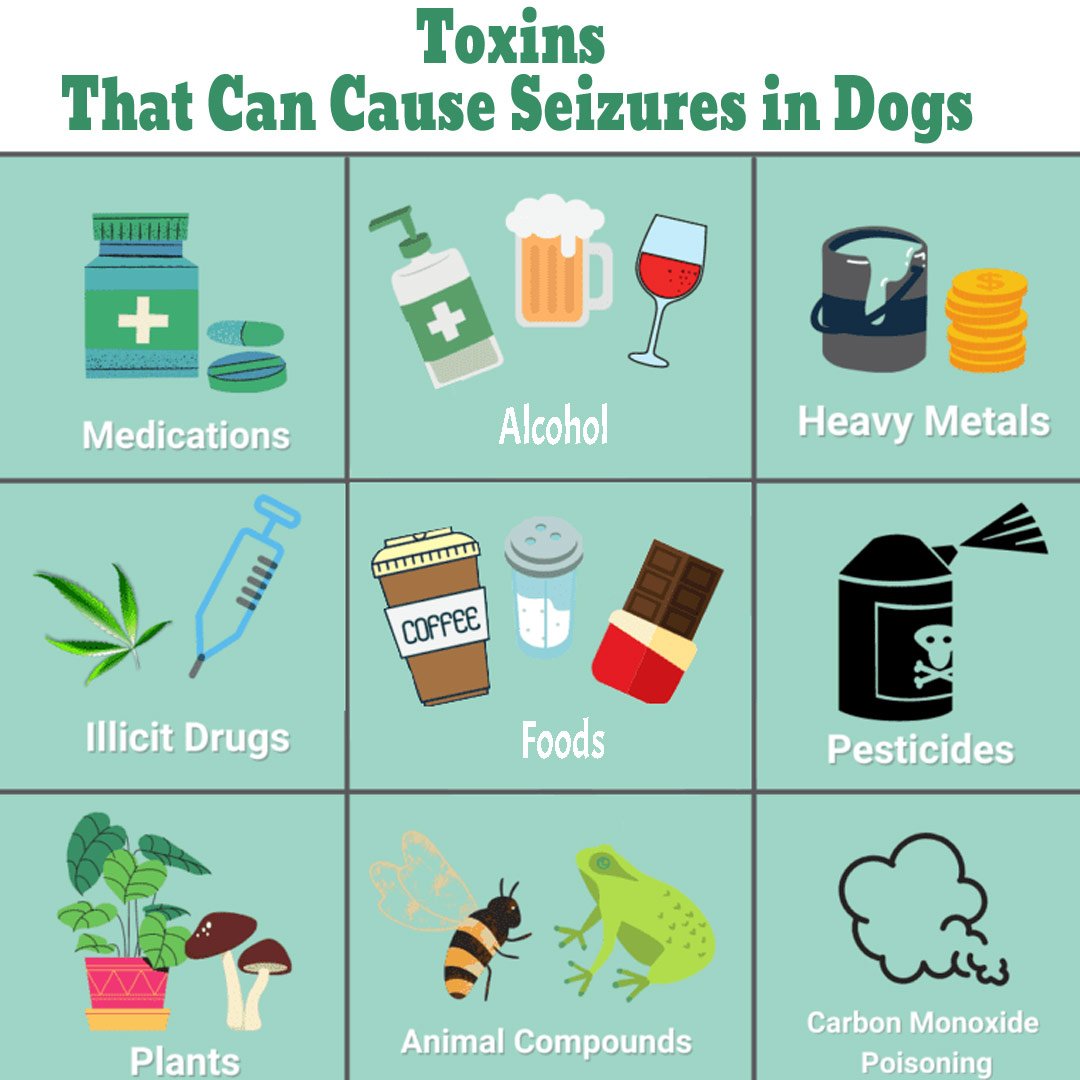Seeing your dog experience a seizure can be a terrifying experience. While seizures can have various causes, including epilepsy, exposure to toxins is a significant concern. This article will explore the different toxins that can trigger seizures in dogs, how to prevent exposure, and the signs to watch out for.
Table of Contents
- 1 Introduction to Canine Seizures and Toxins
- 2 Common Household Toxins Dangerous to Dogs
- 3 Foods That May Induce Seizures in Dogs
- 4 Plants and Chemicals: A Seizure Risk for Dogs
- 5 Preventing Toxin Exposure: Tips for Dog Owners
- 6 Recognizing Seizure Symptoms in Dogs
- 7 What to Do If Your Dog Has a Seizure
- 8 Veterinary Care for Dogs with Seizure Disorders
Introduction to Canine Seizures and Toxins
Canine seizures occur when abnormal electrical activity disrupts the normal function of the brain. This disruption can cause a variety of symptoms, including muscle stiffness, tremors, loss of consciousness, and uncontrollable paddling movements. While some dogs may have idiopathic epilepsy (meaning the cause is unknown), toxins can be a significant trigger for seizures.
Common Household Toxins Dangerous to Dogs
Many seemingly ordinary household items can be toxic to dogs and lead to seizures. Here are some of the most common culprits:
- Medications: Over-the-counter pain relievers like ibuprofen and acetaminophen, as well as some human prescription medications, can be poisonous to dogs and cause seizures.
- Rodenticides and Insecticides: These products often contain ingredients that are specifically designed to target the nervous system of insects and rodents. If ingested by a dog, they can cause severe neurological issues, including seizures.
- Antifreeze: Ethylene glycol, the main ingredient in antifreeze, has a sweet taste that can be attractive to dogs. Unfortunately, even a small amount can be fatal and cause seizures.
- Household Cleaners: Many cleaning products contain harsh chemicals that can be toxic to dogs if ingested or inhaled.
Foods That May Induce Seizures in Dogs
While we love sharing our food with our furry companions, some treats can be dangerous. Here are some common foods that can trigger seizures in dogs:
- Chocolate: Theobromine, a compound found in chocolate, is toxic to dogs and can cause seizures. The darker the chocolate, the higher the concentration of theobromine and the greater the risk.
- Xylitol: This artificial sweetener, commonly found in sugar-free gum and candies, can cause a sudden drop in blood sugar levels in dogs, leading to seizures.
- Caffeine: Coffee, tea, and some sodas contain caffeine, which can be toxic to dogs in high doses and cause seizures.
- Grapes and Raisins: The exact toxin in grapes and raisins that is harmful to dogs is unknown, but ingestion can lead to kidney failure and seizures.
Plants and Chemicals: A Seizure Risk for Dogs
Many plants commonly found in homes and gardens can be poisonous to dogs and cause seizures. Here are a few examples:
- Lilies: There are several varieties of lilies that are highly toxic to dogs and can cause seizures and kidney failure.
- Mushrooms: Wild mushrooms can be difficult to identify, and many varieties are poisonous to dogs. Ingestion can cause a variety of symptoms, including seizures.
- Rodenticide Baits: These baits are often designed to be attractive to rodents, and dogs may be tempted to eat them. They can cause internal bleeding and seizures.
Preventing Toxin Exposure: Tips for Dog Owners
The best way to protect your dog from toxin-induced seizures is to prevent exposure in the first place. Here are some tips:
- Keep medications and household chemicals out of reach.
- Store antifreeze securely and clean up any spills immediately.
- Be mindful of what human food you share with your dog.
- Research any plants you have in your home or garden to ensure they are not toxic to dogs.
- Use pet-safe alternatives to rodenticides and insecticides.
Recognizing Seizure Symptoms in Dogs
If you witness your dog experiencing a seizure, it can be a frightening experience. Here are some common seizure symptoms to watch out for:
- Muscle stiffness or tremors
- Loss of consciousness
- Uncontrollable paddling movements
- Drooling or foaming at the mouth
- Loss of bladder or bowel control
What to Do If Your Dog Has a Seizure
If your dog has a seizure, stay calm and follow these steps:
- Clear the area of any hazards that your dog may bump into.
- Time the seizure. Knowing the duration can be helpful for your veterinarian.
- Do not try to restrain your dog.
- Once the seizure has stopped, try to keep your dog calm and comfortable.
- Contact your veterinarian immediately.
Veterinary Care for Dogs with Seizure Disorders
If your dog experiences a seizure, it’s crucial to seek veterinary attention. Your veterinarian will perform a thorough examination to determine the underlying cause of the seizure and recommend the appropriate treatment. Treatment may include medication to control future seizures and supportive care during
- References:
Metabolic and toxic causes of canine seizure disorders: A retrospective study of 96 cases https://pubmed.ncbi.nlm.nih.gov/19939714/ Most Common Causes of Seizures in Dogs https://www.aspcapro.org/resource/most-common-causes-seizures-dogs I Think My Pet Had a Seizure. Now What? https://vetmed.illinois.edu/pet-health-columns/pet-seizures/ Things In Your Yard That Are Poisonous To Dogs & Cats! https://www.petpoisonhelpline.com/pet-safety-tips/things-in-your-yard-that-are-poisonous-to-dogs-cats/

